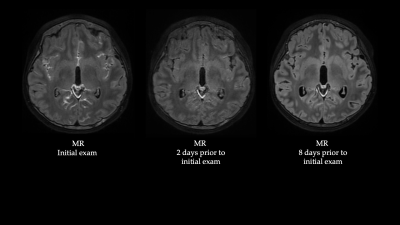Weekday Course
ISMRM-ISMRT Joint Forum: Neuroinflammation
ISMRM & ISMRT Annual Meeting & Exhibition • 03-08 June 2023 • Toronto, ON, Canada

| 08:15 |
Neuroinflammation: Physiology, Clinical Interest of Radiologists
& Interesting Cases
John Port
Keywords: Neuro: Nervous system This talk will give an overview of neuroinflammation and serve as the foundation for the remainder of the session. Neuroinflammation will first be defined, then various causes of neuroinflammation will be presented and discussed from the perspective of a Neuroradiologist using a case-based format. Relevant neuroanatomy will be reviewed to set the stage for a detailed presentation of the physiology of neuroinflammation, including the main biological components (cells, membranes, chemical factors) and how they interact to generate an inflammatory response to injury. |
|
| 08:55 |
An overview of the role of MRI in the diagnosis and monitoring
of multiple sclerosis
Marios Yiannakas
Keywords: Neuro: Nervous system, Neuro: Brain, Neuro: Spinal cord The presentation aims to provide a short introduction to multiple sclerosis and the common characteristics of the disease, and to provide an overview of the diagnostic criteria and the role of MRI in the diagnosis and differential diagnosis of the disease in the clinical setting. In addition, an outline of the role of MRI for monitoring treatment efficacy will be presented, along with treatment safety considerations and the relevant MRI protocol adjustments. |
|
| 09:05 |
A quick guide in MRI protocol for diagnosis and follow-up MS
patients
Cristian Montalba Zalaquett
Keywords: Neuro: Brain, Neuro: Neurodegeneration, Neuro: White matter Multiple sclerosis (MS) is an inflammatory disease of the central nervous system, causing demyelination and neurodegeneration in most patients. For diagnosis, MRI is used as a gold standard. McDonald 2017 criteria, and MAGNIMS 2021 guidelines are the most commonly used for: Differential diagnosis of MS, Monitoring MS, Disease activity, Treatment decisions. In this presentation we will review the main objectives of MRI sequences performed in clinical practice.
|
|
| 09:15 |
 |
TIPS & TRICKS TO OPTIMIZE YOUR INFLAMMATORY BRAIN PROTOCOLS
Bac Nguyen
Keywords: Neuro: Brain For neuro imaging there are many sequences to choose depending on the cases. Thereby, it is important to have a better understanding of which sequences are the most important when it comes to inflammatory brain protocols. To minimize errors at a big department with many technicians, it is mandatory to setup the protocol with an easy workflow. Today, we have artificial intelligence in our hands as an important tool not only for enhancing the quality and/or speeding our sequences, but also for the protocol setup. With that said, we are not only minimizing errors, but also increasing efficiency. |
| 09:25 |
Panel Discussion |
|
| 09:35 |
Advanced Imaging for Neuroinflammation Research
Erin MacMillan
Keywords: Neuro: Nervous system, Contrast mechanisms: Spectroscopy, Contrast mechanisms: Diffusion There is a large unmet need for MRI to provide clinically meaningful information about inflammatory processes in the brain to improve the ability to differentiate between various diseases. Currently, conventional MRI techniques do not provide specific information about inflammatory processes which leads to a long list of differential diagnoses arising from similar features on diagnostic MR images. This presentation will provide an overview of how advanced MR techniques such as spectroscopy, diffusion tensor imaging, and susceptibility weighted imaging aim to provide information about specific pathological processes in the central nervous system. |
The International Society for Magnetic Resonance in Medicine is accredited by the Accreditation Council for Continuing Medical Education to provide continuing medical education for physicians.